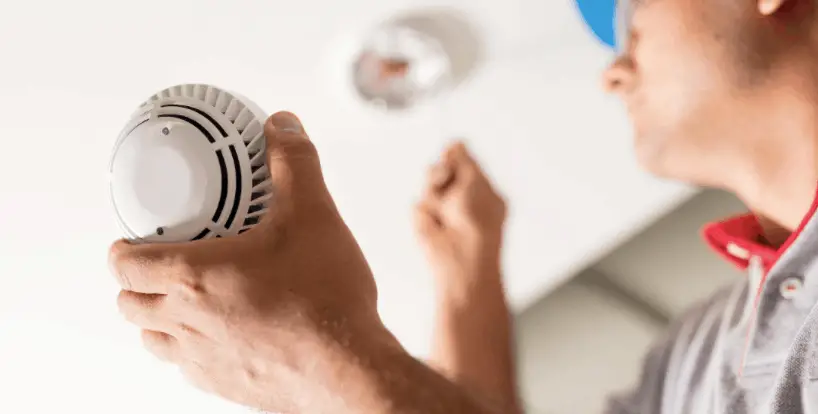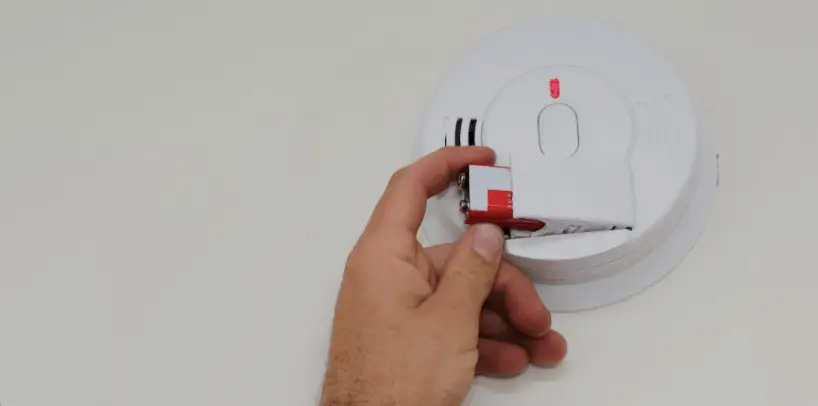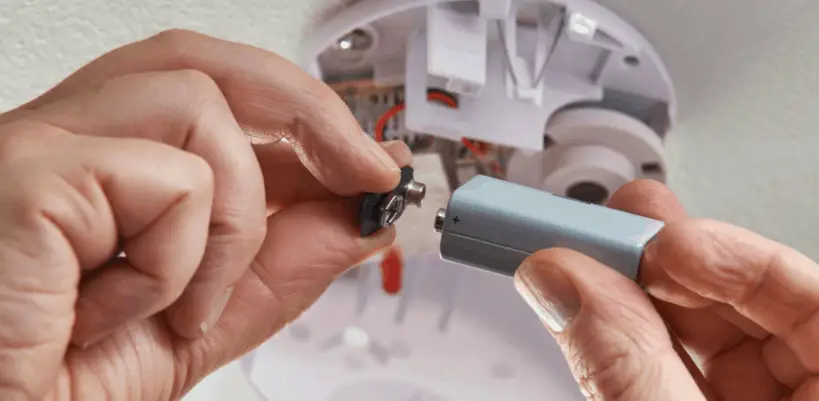Any dispatcher will agree that the most comment call they get is regarding how to turn off a fire alarm. There is no automatic turn-off function, nor will the device recognize if the fire is already under control. Hence, the sound will continue until someone turns off the alarm. We’ll run through some steps and different models below.
To turn off your fire alarm, remove the batteries first. After that, press and hold the “hush” button until it turns off the sound. And for hardwired fire alarms, disconnect the device by turning off the circuit breaker. Remove the batteries and press the silence button.
How to turn off Standalone (DC) Model Fire Alarms

Step 1: Detach the old batteries.
Step 2: Press and hold the hush button until it stops beeping.
Step 3: Insert new batteries. It will chirp when it connects to power.
How to turn off a Hardwired (AC) Smoke Alarm
Step 1: Turn the circuit breaker off to disconnect the device.
Step 2: Remove the old batteries.
Step 3: Press the silence button for about 20 seconds or until the alarm stops.
Step 4: Insert the new batteries and reinstall the alarm. Reconnect the electrical wires and switch on the circuit breaker.
How to Stop False Fire Alarms?

#1. Replace the old batteries
Old batteries are one of the common problems when it comes to alarms. When power weakens, the detector will generate a beeping sound every few minutes as an indication to change them. Both standalone and hardwired systems require batteries. When replacing the batteries, pay close attention to what batteries you will use. It should be the same voltage as the old one.
However, some states, like California, require battery-powered smoke alarms that last up to 10 years. These batteries are inaccessibly sealed. In this case, the beeping sound of the alarm is a sign that you should replace your smoke detector.
#2. Clean your smoke alarm
There may be dust, insects, or dirt stuck in your wall or the detector. Remove your alarm from the wall to safely clean your smoke detector. Use a crevice tool on your vacuum to remove the dust or any substance in the wall and the alarm.
1) First, unplug the alarm from the power supply and remove its batteries.
2) Use a vacuum cleaner to eliminate dust and dirt in the area around the alarm.
3) Clean the hard surface areas with soap and water. Never use any abrasive material, as it can damage your smoke detector.
4) Take a cloth or paper towel and wipe down soft surfaces such as buttons, screws, vents, etc.
#3. Try resetting the Fire Alarm
Easy steps to reset the hardwired fire alarm
Step 1: Use your house circuit breaker to stop the electric flow to your detector. (1)
Step 2: Remove the alarm and its batteries.
Step 3: Hold the alarm by its edge; clean the dust using a keyboard cleaner. (2)
Step 4: Press and hold the test button for five seconds.
Step 5: Reconnect the alarm to power and its batteries. When it connects to power, it will chirp.
Simple methods to reset a battery-powered fire alarm
Step 1: Remove the battery.
Step 2: Press and hold the test button.
Step 3: Reattach the battery. It will tweet once it reconnects to power.
#4. Try Testing the Silent Button
This feature of most alarms temporarily lowers the smoke sensors’ sensitivity for 8 to 10 minutes. It would be best if you only used this option with a general alarm condition, such as smoke or heat from cooking. Moreover, we will show you how to use it in just three steps.
Step 1: Press the hush/silence button. It will silence the entire system. The button may also say “test.” However, it will keep beeping if there is smoke or debris in the surroundings.
Step 2: The alarm will reset in 8 to 10 minutes, given that the smoke or debris is cleared. You can press the button constantly until the air is clean.
Step 3: Push the test/hush button to finish the hush period.
#5. Get a New Fire Alarm
Your fire alarm may be too old or malfunctioning, and it might be time to replace it.
One of the first things you should do is contact your local fire department to find out what type of alarms they recommend. This will help you identify the best system for your home.
Electronic detectors are one option. These use an alarm signal and a radio frequency signal to detect smoke, which can help prevent false alarms.
Another type of detector is optical smoke detection, which detects heat using an infrared beam and a sensor.
Many choose this because it’s easier to install and doesn’t need maintenance checks or batteries.
If you want a more affordable system, ionization smoke detectors are also an option with a low price point but a high level of detection quality.
Frequently Asked Questions (FAQ)

Why do smoke alarms go off for no reason?
When the fire alarm is triggered, there is likely a fire in the house. However, fire alarms do go off out of the blue. Your smoke alarms May go off on their own for any of these reasons:
- Batteries are dying
- The alarm device is too old.
- There is dust or insects in the alarm.
- Power interruptions (on hardwired alarms)
- The fire alarm is close to the steam, sunlight, etc.
- The silence button is accidentally pushed
- Incorrect wiring on AC or AC/DC smoke detectors
- The alarm malfunctioned
Can tripping the circuit breaker turn off the beeping?
If you have a hardwired smoke alarm, try turning the switch on the breaker to see if the beeping stops; sometimes, it acts as a reset and helps stop the beeping.
Is the battery causing the beeping sound?
The fire alarm’s beeping sounds sometimes are caused by installing a battery in the wrong way. To stop this beeping, you should turn off your circuit breaker, detach the alarm from the electrical wires and reinstall the batteries.
Can I turn off a fire alarm in a hotel room?
Yes, you can, but it is not a good idea. I highly recommend that you should not deactivate smoke detectors in hotel rooms. If you were to turn off the alarm and a fire started for any possible reason, you would be liable for all the damage caused.
How can I avoid setting false alarms?
The simplest way of dealing with false alarms is to maintain your smoke detectors. Change your alarm’s batteries regularly according to what you can see in the manual’s description. Always clean the device to avoid dust and debris stuck in your device.
Should I turn my alarm off when cooking?
This is a tricky question. While some supporters say it’s okay to turn it off, others say not. However, the best answer will depend on what kind of fire alarm you have. If you have an ionization smoke alarm, you should keep it on because this type of smoke detector detects both fast-burning and smoldering fires that can start without warning.
Can fire alarms malfunction?
A study by the National Fire Protection Association (NFPA) found that more than half of all false alarms were caused by malfunctions in existing fire alarm systems. There was no clear pattern to show what type of malfunction was most prevalent, but circuit overload, low batteries, poor installation, or improper wiring triggered many false alarms.
Wrapping Up
Overall, fire alarms should only go off when there is a fire within the area. So, if it happens randomly, then it is safe to assume that there is an issue. In this case, learning how to reboot the fire alarm will help you greatly.
References:
(1) circuit breaker – https://electronics.howstuffworks.com/circuit-breaker.htm
(2) keyboard cleaner – https://www.businessinsider.com/how-to-clean-keyboard

